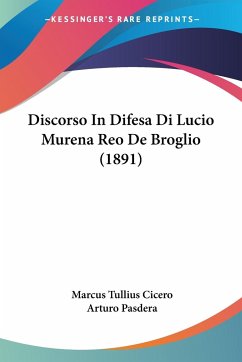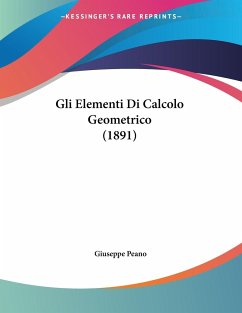
Discorso In Difesa Di Lucio Murena Reo De Broglio (1891)
Versandkostenfrei!
Versandfertig in 1-2 Wochen
23,99 €
inkl. MwSt.

PAYBACK Punkte
12 °P sammeln!
Discorso In Difesa Di Lucio Murena Reo De Broglio (1891) est un livre de Cic¿¿¿¿¿ron, ¿¿¿¿¿galement connu sous le nom de Marcus Tullius Cicero, un c¿¿¿¿¿l¿¿¿¿¿bre orateur et homme politique romain de l'Antiquit¿¿¿¿¿. Ce livre est un discours prononc¿¿¿¿¿ par Cic¿¿¿¿¿ron en 63 av. J.-C. pour d¿¿¿¿¿fendre Lucius Licinius Murena, un s¿¿¿¿¿nateur romain accus¿¿¿¿¿ de corruption ¿¿¿¿¿lectorale. Le discours est divis¿¿¿¿¿ en plusieurs parties, dans lesquelles Cic¿¿¿¿¿ron expose les arguments de la d¿¿¿¿¿fense et r¿¿¿¿¿fute le...
Discorso In Difesa Di Lucio Murena Reo De Broglio (1891) est un livre de Cic¿¿¿¿¿ron, ¿¿¿¿¿galement connu sous le nom de Marcus Tullius Cicero, un c¿¿¿¿¿l¿¿¿¿¿bre orateur et homme politique romain de l'Antiquit¿¿¿¿¿. Ce livre est un discours prononc¿¿¿¿¿ par Cic¿¿¿¿¿ron en 63 av. J.-C. pour d¿¿¿¿¿fendre Lucius Licinius Murena, un s¿¿¿¿¿nateur romain accus¿¿¿¿¿ de corruption ¿¿¿¿¿lectorale. Le discours est divis¿¿¿¿¿ en plusieurs parties, dans lesquelles Cic¿¿¿¿¿ron expose les arguments de la d¿¿¿¿¿fense et r¿¿¿¿¿fute les accusations port¿¿¿¿¿es contre Murena. Il utilise des techniques rh¿¿¿¿¿toriques sophistiqu¿¿¿¿¿es pour convaincre le jury de l'innocence de Murena et pour souligner l'importance de la justice et de l'¿¿¿¿¿quit¿¿¿¿¿ dans le syst¿¿¿¿¿me juridique romain. Le livre est consid¿¿¿¿¿r¿¿¿¿¿ comme l'un des meilleurs exemples de l'art de la rh¿¿¿¿¿torique dans l'Antiquit¿¿¿¿¿ romaine et est ¿¿¿¿¿tudi¿¿¿¿¿ aujourd'hui comme un exemple de la fä¿¿¿¿on dont les avocats peuvent utiliser la rh¿¿¿¿¿torique pour persuader un public.This Book Is In Italian.This scarce antiquarian book is a facsimile reprint of the old original and may contain some imperfections such as library marks and notations. Because we believe this work is culturally important, we have made it available as part of our commitment for protecting, preserving, and promoting the world's literature in affordable, high quality, modern editions, that are true to their original work.












